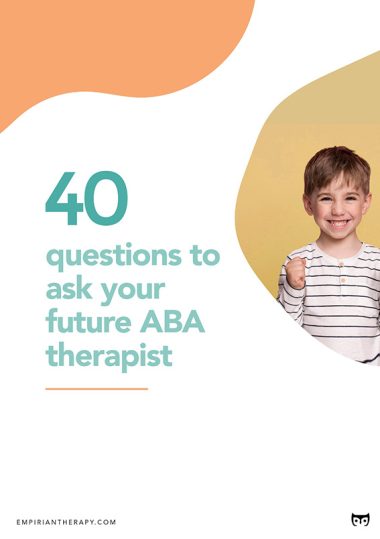ABA stands for Applied Behavior Analysis. In a nutshell, ABA uses the science of behavior to solve real-life problems of social importance.
The way it works is quite simple. Behavior analysts analyze the circumstances leading up to and following a behavior and make changes in those circumstances, hoping to thereby change the behavior over time. They continually take data to determine if the desired behavior change has been achieved, and make adjustments based on the data analysis. For more info, see our article “What is ABA.”
ABA is just applying what we know about the science of behavior to make it easier to behave the way we want to in the future. The science of behavior is already present in so many aspects of our life, we just don’t realize it.
Even though ABA is a kind of therapy often associated with those diagnosed with autism, the truth is that almost anyone who has a behavior they wish to change can benefit from it.
And many do. There is no one demographic that ABA is exclusively for. People of all ages, backgrounds and needs have benefited from trying it.
At the end of the day, ABA is just applying what we know about the science of behavior to make it easier to behave the way we want to in the future. The science of behavior is already present in so many aspects of our life, we just don’t realize it.
All these are ways the science of behavior is used in the natural environment:
- Grocery stores place chocolate bars and gum by the cash registers so that you are more likely to make an impulse purchase
- Stop signs, speed limit signs and signs telling you to wear a mask and social distance
- Tickets for speeding, running red lights or any other traffic or driving violations
- Bonuses at work for doing a good job
- Increased supervision if you’re caught slacking off
You probably even use the science of behavior without realizing it, with yourself, your spouse or your children:
- Awarding treats or prizes for good behavior
- Not responding to whining, but responding when they ask nicely for something
- Incentives for doing unwanted chores or homework
- Asking your spouse to do a specific chore, leaving a reminder so they won’t forget, and praising or thanking them after it’s done
The techniques of ABA are rooted in human behavior and its surrounding circumstances, and that is why it can be used to help anyone who needs changes or improvement in their behavior.
Data shows that treatment approaches based on ABA are effective in a wide variety of areas.
Here are some ways ABA can help in our daily lives:
- Feeding: As many as 25-45% of children have feeding or swallowing problems. ABA can help children increase food acceptance, decrease stuffing or packing (storing food in the mouth) and learn to self-feed.
- Toileting: Almost 25% of children have some difficulty with toileting. ABA can help children recognize their urges and successfully use the bathroom.
- Sleep: Between 20-40% of infants and children experience sleep problems. While many people successfully learn to sleep efficiently when they are babies, some don’t. ABA can help those who struggle with sleep problems, including bedtime resistance, delayed sleep onset (taking too long to fall asleep), night waking, early morning waking, sleep dependencies (like needing certain items or activities to fall asleep) and co-sleeping (kids sleeping in their parents’ bed).
- Anxiety and Phobias: ABA is very effective in helping people cope with anxieties and phobias, including separation anxiety, test anxiety, social anxiety and other specific phobias like fear of public speaking or flying.
- Parenting: ABA can help parents decrease their children’s problematic behaviors and increase compliance, help with behaviors when shopping or dining out, negotiate conflicts with teens, improve parent-child relationships and interactions and even improve the well-being of parents.
- Education and Learning: ABA can improve students’ behavior in school, help students with homework completion and staying on task in class, improve studying and test-taking skills and even improve student-teacher relationships.
If you think there is an aspect of your life that could benefit from ABA therapy, please don’t hesitate to reach out to the Empirian team for more information or to discuss how we may be able to help. Change is possible—but only once you take the first step!


